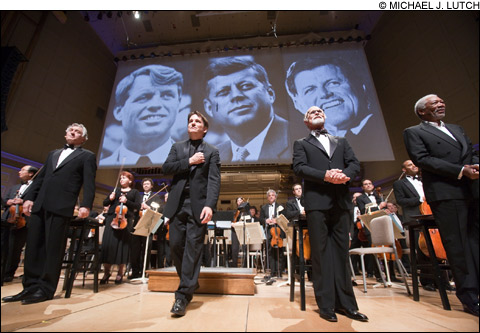
A KENNEDY TRIBUTE The actors made it an occasion; the music did not. |
Some lovers of religious music consider Heinrich Schütz even greater than Bach, who was born 13 years after Schütz’s death. Schütz was a composer of great spiritual purity, though without Bach’s range. David Hoose and the Cantata Singers centered their entire season on Schütz, in the context of such composers as Bach and Schoenberg. But they ended with an entire evening of him: his rarely heard swan song, Schwanengesang, composed when he was 86 — a series of 13 motets for double chorus and orchestra that include a setting of the 176-verse Psalm 119 plus Psalm 100 (“Shout with joy to the Lord”) and the German Magnificat. The score was thought lost until 1900; it then got lost again before being refound. Its very first performance was in 1981.“There are no fireworks,” Hoose announced, preparing the audience for 90 intermissionless minutes of quiet, sometimes sublime devotion, with musical subtleties mostly so refined, they made the interminable repetitions of Psalm 119 (I am devoted to your law, so, please, God, protect me from slanderers) feel unvaried. In the happy outburst of Psalm 100, some drama finally emerged.
This noble effort had chorus and orchestra — plus tenor Jason Sobol, the only soloist — close to their best. And Hoose is a profoundly thoughtful and serious conductor. Never having heard this piece before, I did wonder whether there might be some way he could have italicized the musical contrasts, brought them more audibly to the surface. But maybe that’s not what this austerely private score wants to be — except in that penultimate moment of welcome ecstasy.
The Pops celebrated its 125th anniversary with a newly commissioned tribute to Jack, Bobby, and Ted Kennedy, The Dream Lives On, by composer and movie arranger Peter Boyer. Pops director Keith Lockhart assembled a stellar cast of readers. Cherry Jones narrated a rhymed introduction and conclusion by librettist Lynn Ahrens (lyricist for Ragtime), Robert De Niro read JFK, Ed Harris RFK, and Morgan Freeman Ted. At the press conference, Boyer was asked how much he owed to Copland’s A Lincoln Portrait, another piece in which an orchestra accompanies famous patriotic speeches. This was different, he answered, because it was about three people, not one, and all more recent than Lincoln — though his music was of course “informed” by Copland, Bernstein, and John Williams.
We saw touching film clips, assembled by Susan Dangel and Dick Bartlett, while the Tanglewood Festival Chorus intoned orgasmic wordless notes behind (or over) the speeches. It all sounded like one of those inspirational Oscar segments (Boyer arranged two of those telecasts), and desperate to be moving, with boxes of Kleenex provided on every table. The audience, which included a number of Kennedys, seemed stirred. But the glossy patriotism — more manufactured than composed — didn’t have a nanosecond of originality, surprise, or personality. Only the eloquent delivery of the actors created the illusion that they might actually be participating in what Lockhart kept calling a “historic” event.
We also got Arlo Guthrie (in a “This Land Is Your Land” sing-along) and Broadway’s Brian Stokes Mitchell (repeating the same Ted Kennedy story and two of the corny songs from his Celebrity Series concert just 10 days before), as well as the “National 9/11 Flag,” an honor guard of 9/11 firefighters and, most moving of all, Tara, one of the heroic 9/11 dogs.
Editor's Note: In a previous version of this article, the 9/11 dog Tara was misidentified as "Tanya," and Susan Dangel was misidentified as "Susan Dangle."